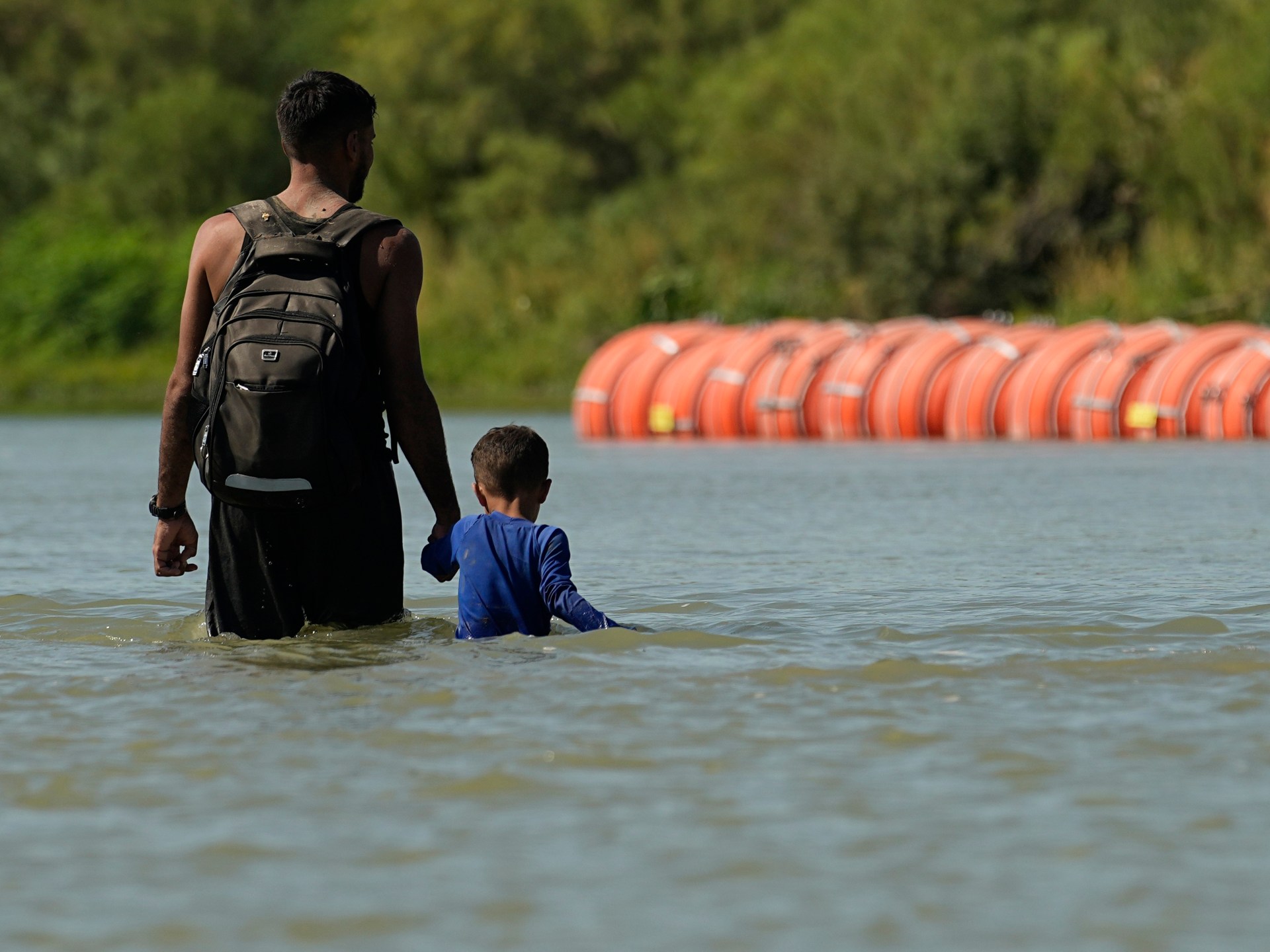A United States federal judge has ordered Texas to remove a controversial floating border barrier from the Rio Grande after the massive buoys and underwater nets came under fire for endangering migrants and asylum seekers as they crossed the river from Mexico.
In a ruling on Wednesday, US District Judge David Ezra said that the barriers could violate treaty agreements between the US and Mexico. He also cast doubt on their effectiveness.
“The State of Texas did not present any credible evidence that the buoy barrier as installed has significantly curtailed illegal immigration across the Rio Grande River,” Ezra wrote. He ordered the barrier to be moved to an embankment on the Texas side of the river by September 15.
Within hours of the decision, Texas had already filed an appeal, with Governor Greg Abbott calling the judge’s ruling an attack on the state’s “sovereign authority”.
“Texas is prepared to take this fight all the way up to the Supreme Court,” Abbott, a Republican, said in a statement on Wednesday shared via social media.
The four-foot-wide orange buoys became the subject of debate after being installed by Abbott’s administration in July as part of a larger migration deterrence effort known as Operation Lone Star.
Critics, however, denounced the barrier as a dangerous political stunt. By the end of July, the Department of Justice — under Democratic President Joe Biden — had sued the state for refusing to remove the barrier, saying the buoys violated federal law.
BREAKING: a federal judge has ordered Gov Abbott to remove his border buoy death trap from the Rio Grande.
They should also remove the miles of deadly razor-wire strung along the river, which continues to pose a life-threatening risk to people & wildlife.pic.twitter.com/EKgC7ReMwQ
— Laiken Jordahl (@LaikenJordahl) September 6, 2023
In the suit, the Justice Department alleged that Texas had installed the barrier on an international boundary without properly consulting federal authorities.
Abbott, meanwhile, has dismissed the lawsuit as a political attack and blamed Biden for failing to crack down on unauthorised border crossings.
“Today’s court decision merely prolongs President Biden’s willful refusal to acknowledge that Texas is rightfully stepping up to do the job that he should have been doing all along,” Abbott said in a press release.
But Abbott’s administration has come under increasing scrutiny for its tactics along the US-Mexico border.
A letter released in July, reportedly authored by a Texas state trooper, expressed concerns with policies and decisions being implemented to repel migrants and asylum seekers.
The trooper explained he believed in the mission of Operation Lone Star, but that he had grave concerns with directions he had been given to “push” struggling migrants back into the Rio Grande and deny them water to drink.
“I believe we have stepped over a line,” his letter reads.
In August, two bodies were found in the Rio Grande near the border barrier, one of which was tangled in the buoys. Texas authorities said it appeared the two people had drowned in the river, known for its deadly currents.
Questions also arose over whether the barrier violated Mexican sovereignty.
In an August statement, Mexico’s foreign ministry expressed concern “about the impact on migrants’ human rights and personal security that these state policies could have, as they go in the opposite direction to close collaboration”.
While the Biden administration has criticised the barriers on humanitarian grounds, migrant rights groups have slammed the president for enacting policies that they say severely restrict the right to seek asylum.
The administration is currently facing an ongoing legal challenge to a policy that requires asylum seekers to first apply in the countries they pass through before arriving in the US, similar to the “safe third country” rule enacted under former President Donald Trump.
Critics have called the policy an “asylum ban” and a violation of international law.
For decades, critics have likewise denounced policies that drive migrants and asylum seekers to dangerous border crossings by blocking safer areas.
This tactic, known as “prevention through deterrence”, has its roots in the 1990s, but many immigration rights advocates believe it has pushed migrants and asylum seekers to take on greater risks in the absence of accessible legal pathways into the country.
Sumber: www.aljazeera.com
 Skip to content
Skip to content

